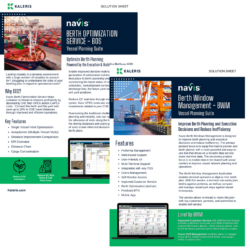Integrating Berth Window Management and Berth Optimization Services offers a holistic approach to improving port operations.
Navis BWM + BOS streamlines scheduling, optimizes resource utilization, enhances throughput, and provides a range of benefits that ultimately contribute to more efficient, cost-effective, and reliable port services.
Check out the top 10 reasons you should consider implementing Navis BWM + BOS.
- Efficient Resource Allocation: N4 BWM and BOS together help ports allocate berthing slots based on optimized scheduling. This reduces the likelihood of congested berths and ensures that resources like cranes and labor are utilized efficiently.
- Reduced Waiting Times: The optimized scheduling provided by these systems minimizes waiting times for ships, enhancing the overall turnaround time for vessels. This leads to quicker cargo loading and unloading, which is crucial for efficient logistics.
- Enhanced Throughput: By streamlining berth usage and minimizing idle time, the throughput capacity of the port is increased. This means that the port can handle a higher volume of ships and cargo without congestion issues.
- Cost Savings: Efficient berth management and optimization lead to cost savings. Ports can reduce operational costs related to labor, equipment, and energy by ensuring smoother operations and minimizing downtime.
- Improved Predictability: With accurate scheduling and optimization, both shipping companies and cargo owners gain predictability in terms of when their vessels will be handled. This enables better planning of supply chains and reduces uncertainty.
- Customer Satisfaction: Reliable and efficient port operations contribute to better customer satisfaction for both shipping companies and cargo owners. Delays and uncertainties are minimized, leading to more positive relationships.
- Environmental Impact: By reducing idle times and optimizing vessel movements, ports can potentially lower their environmental impact. Efficient operations result in reduced emissions from vessels waiting in queue and optimized fuel consumption.
- Competitive Advantage: Ports that implement N4 BWM and BOS effectively position themselves as modern, efficient, and competitive facilities. This can attract more shipping traffic and contribute to the port’s growth.
- Data-Driven Insights: These systems generate a wealth of data related to vessel movements, berth utilization, and operational efficiency. Analyzing this data can provide insights for continuous improvement and strategic decision-making.
- Risk Mitigation: By avoiding congestion and unnecessary delays, ports decrease the risk of accidents, collisions, and operational disruptions, enhancing safety throughout the port area.
Ready to learn more?
Download the product sheets or Contact Us today!
